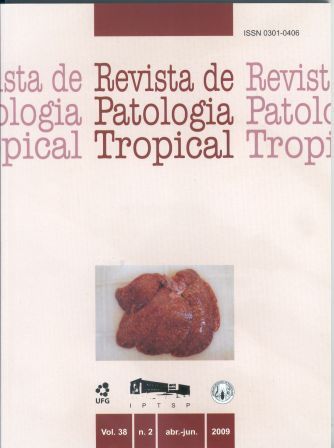RISCO DE TRANSMISSÃO DE MALÁRIA HUMANA EM ÁREA DE IMPLANTAÇÃO DE PROJETO DE PROSPECÇÃO MINERAL, MUNICÍPIO DE JURUTI, ESTA DO DO PARÁ
DOI:
https://doi.org/10.5216/rpt.v38i2.6607Palavras-chave:
Malária, Transmissão, Prospecção mineral, Juruti, estado do ParáResumo
Este estudo objetivou avaliar o risco de transmissão de malária humana em áreas de influência do
projeto Juruti no período 2006 a 2008. Um total de 976 mosquitos anofelinos foram capturados por atração humana protegida, identificados e processados para determinação de infectividade pelo teste de imunoensaio (ELISA) e, parte deles (10%), para taxa de paridade. Para o inquérito hemoscópico, foram feitas duas coletas (setembro/2007 na comunidade Capiranga e invasão Nova Vitória e março/2008 somente na última) utilizando-se o método da gota espessa (GE). Foram identificadas oito espécies de mosquitos anofelinos, com predomínio da espécie An. albitarsis s.l (76,8%) cuja taxa de paridade foi de 9,6%. A taxa de infecção foi zero para os primeiros dois anos de estudo e de 0,5% em 2008, quando um exemplar de An. albitarsis s.l coletado na comunidade de Santa Maria foi positivo para P. vivax-VK247. O índice de picada homem/hora (IPHH) variou de 0,1 a 8,1. Todas as 148 amostras de sangue foram negativas pela GE. Concluiu-se, portanto, que o risco de transmissão de malária na área estudada é baixo, apesar da presença de mosquitos vetores. Contudo, faz-se necessária vigilância permanente por causa, principalmente, do intenso fluxo migratório gerado pelo projeto.
Downloads
Downloads
Publicado
Como Citar
Edição
Seção
Licença
The manuscript submission must be accompanied by a letter signed by all authors stating their full name and email address, confirming that the manuscript or part of it has not been published or is under consideration for publication elsewhere, and agreeing to transfer copyright in all media and formats for Journal of Tropical Pathology.

